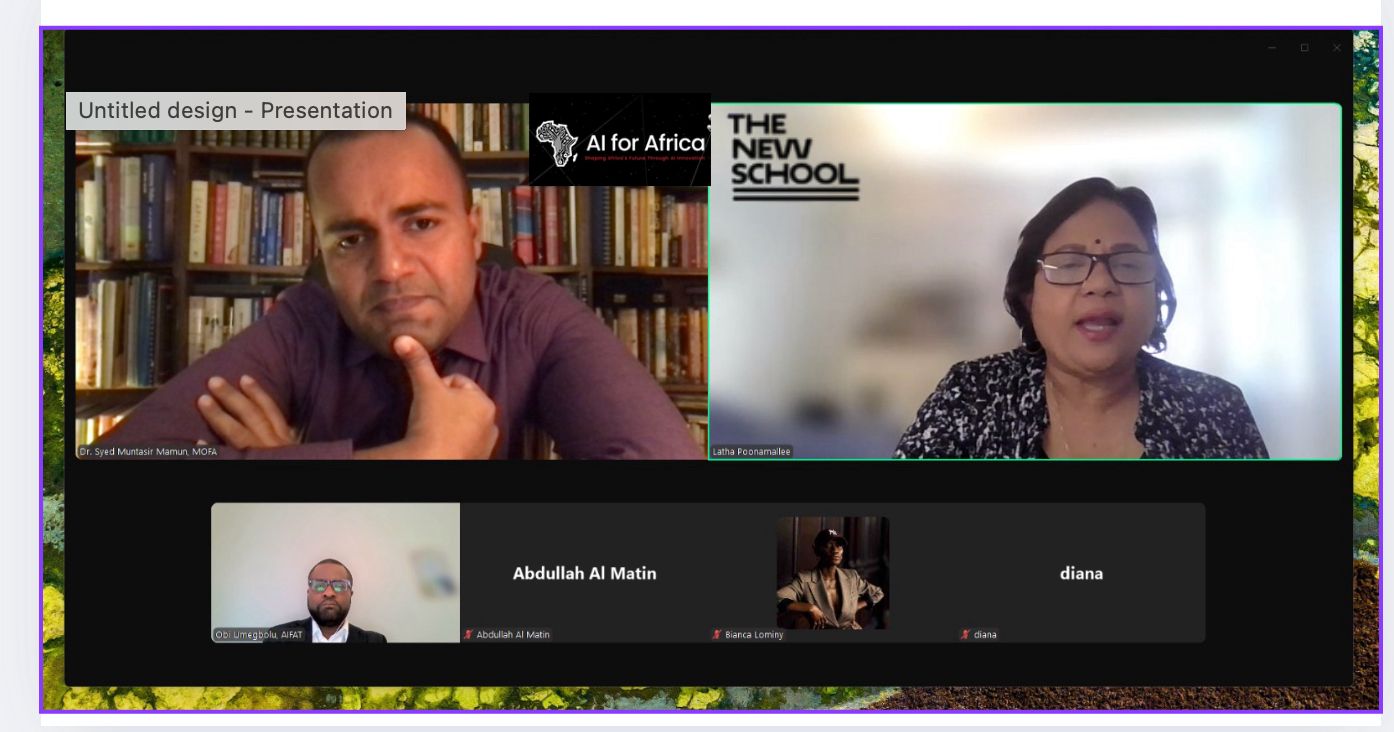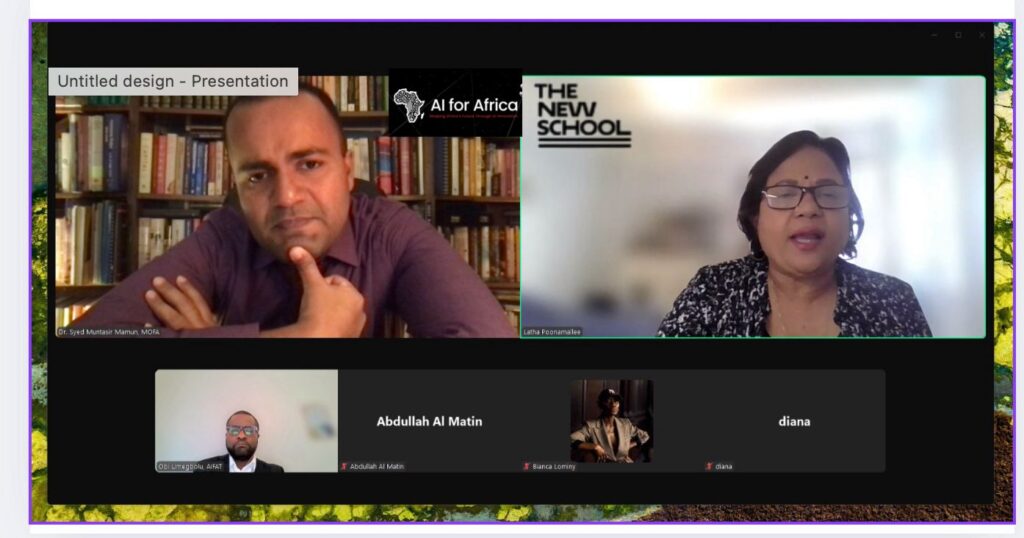Physical Address
304 North Cardinal St.
Dorchester Center, MA 02124
Physical Address
304 North Cardinal St.
Dorchester Center, MA 02124


AI for Africa Thinktank, in collaboration with The New School New York, recently concluded with resounding success! The theme, “AI Startups in Africa: Leapfrogging Voids with Smart Solutions,” fueled vibrant discussions and collaborative brainstorming among innovators, policymakers, academics, and entrepreneurs from around the globe. The event served as a catalyst for advancing an inclusive AI ecosystem customised for African realities.
The Panelists
Obi Umegbolu – founder AI for Africa Thinktank
Dr Syed Muntasir Mamum – Director General, Ministry of Foreign Affairs Bangladesh
Cory Warfield – Influencer & Serial Entrepreneur
Dr Bernard Ngalim – Consultant IT Law & Development
Slava Baranovskiy – Tech Entrepreneur & Researcher
Professor Marco Lamas – Tech Entrepreneur & Researcher
Abdullah Al-Matin – Quality Assurance & Cybersecurity
Here’s a glimpse into the impactful discussions and why this conversation is crucial:
Key Highlights from the Conference
1. Context-Driven AI Solutions for African Challenges
Panelists explored how AI startups can address systemic voids in Africa by tailoring solutions to local needs. From precision agriculture to AI-powered healthcare diagnostics, examples highlighted how context-specific AI applications—such as climate modeling or disease prediction—are driving both economic and social impact. Startups are ensuring their solutions are culturally and economically relevant, recognising the need for AI to understand and adapt to local contexts.
2. Collaborative Ecosystems and Intra-African Partnerships
The conference underscored the importance of collaboration and partnerships in scaling AI solutions across Africa. Discussions emphasized the role of South-South knowledge exchanges in AI innovation and how governments, academia, and private sectors can collaborate to support AI ecosystems. Intra-African partnerships were championed as a way to scale solutions across borders, fostering collective action.
3. Ethical AI Governance and Inclusive Innovation
Ensuring ethical practices in AI deployment was a focal point. Discussions revolved around frameworks that prioritise data sovereignty, privacy, and equitable access to technology. Ethical governance fosters trust among users, investors, and communities—a critical factor for scaling solutions sustainably. Implementing guidelines to ensure technologies are used ethically and fairly, fostering responsibility.
4. Building Local Talent and Reducing Dependency
Africa’s youthful population is its greatest asset in the AI revolution. Discussions emphasized the urgent need for structured training programmes, coding academies, and mentorship initiatives. Rwanda’s Coding Academy and Nigeria’s Mountmove Global were cited as examples of building a robust pipeline of local talent. Tech CEOs were encouraged to invest in AI startups and innovation hubs to bridge the gap between available digital skills and market needs.
5. Insights from Bangladesh: Digital Transformation in Governance
A unique and inspiring contribution came from delegates from Bangladesh, who shared insights on the country’s journey in digital transformation within its governance structures. The presentation highlighted adaptable strategies already showing promise in some African nations. This South-South cooperation offers a valuable blueprint for leveraging technology to enhance governance, transparency, and citizen engagement across the continent.
6. Developing Infrastructure for AI Growth
The conference underscored the importance of scalable data centers powered by renewable energy sources like solar and wind. Prioritizing building scalable, high-capacity data centers in key urban hubs. Discussions included leveraging Africa’s abundant solar, wind, and hydro resources to power data centers sustainably.
Why Conferences Like This Matter
Africa faces unique challenges—limited infrastructure, uneven internet connectivity, and gaps in digital skills—but it also holds immense promise. Events like The New School and AI for Africa Thinktank conference shine a spotlight on these issues while offering actionable solutions. By bringing together diverse stakeholders, we’re building change.
For example:
What’s Next? Join Us in May!
The momentum doesn’t stop here! We’re thrilled to announce that we’ll be hosting a full-day conference this May (date to be announced soon). Stay tuned for updates—we’ll be sharing more details soon!
Conclusion
Africa is on the verge of an AI revolution, but success depends on collective effort. We need governments to invest in infrastructure, universities to align curricula with industry needs, and tech leaders to mentor emerging startups. Most importantly, we need YOU—innovators, investors, policymakers—to join this movement.
Let’s build data centers powered by Africa’s sun and talent. Let’s train ethical algorithms that reflect our languages, cultures, and struggles. Let’s code equity into the future.
We must ensure that AI in Africa is driven by African talent solving African challenges—and creating African success stories. Share your thoughts below or reach out if you’d like to collaborate or attend our upcoming event!